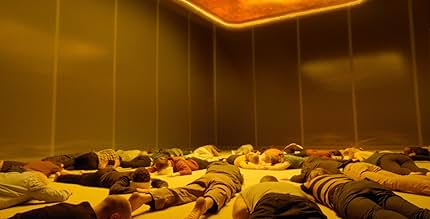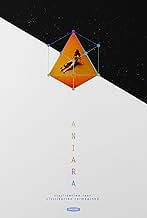A spaceship carrying settlers to Mars is knocked off course, causing the consumption-obsessed passengers to consider their place in the universe.A spaceship carrying settlers to Mars is knocked off course, causing the consumption-obsessed passengers to consider their place in the universe.A spaceship carrying settlers to Mars is knocked off course, causing the consumption-obsessed passengers to consider their place in the universe.
- Directors
- Writers
- Stars
- Awards
- 11 wins & 10 nominations total
Emelie Garbers
- Mimaroben
- (as Emelie Jonsson)
- Directors
- Writers
- All cast & crew
- Production, box office & more at IMDbPro
Featured reviews
Toward the end of "Aniara" I kept thinking: thank god Bergman never made a science fiction movie. If you think Mother Earth is bleak, wait until you get lost in space, like the characters in "Aniara" do. And you truly do feel as though you're lost with them.
There are few ideas more appalling than drifting inexorably through the infinite blackness of space, not knowing if you're ever going to stop. "Aniara" provides a bleak portrait of people losing their minds as this goes on, resorting to cults, orgies and suicide.
It's a bit like "2001: A Space Odyssey" in reverse. That was about the development of the human species from pre-sapien species to our becoming one with the stars. "Aniara" begins with the stars, rejects oneness, and shows our utter devolution in space.
I say check it out.
There are few ideas more appalling than drifting inexorably through the infinite blackness of space, not knowing if you're ever going to stop. "Aniara" provides a bleak portrait of people losing their minds as this goes on, resorting to cults, orgies and suicide.
It's a bit like "2001: A Space Odyssey" in reverse. That was about the development of the human species from pre-sapien species to our becoming one with the stars. "Aniara" begins with the stars, rejects oneness, and shows our utter devolution in space.
I say check it out.
The name Aniara comes from the ancient Greek for "sad and despairing" and it lives up to the title.
I haven't read the poem that it is based on, but it is a really solid sci-fi. The acting is good throughout, and I never felt that I was watching a low budget movie.
This is a perfect example of what independent films should be.
This is a type of apocalyptic storytelling that is so beautiful. It doesn't hinge on false futurisms or morality - it is based on the sorrows that define our lives when we lose all hope. A slow burn that is so worth the indulgence.
This is based on a much-loved poem in Swedish written in 1956 (when my school debating club seriously considered "That man will never reach the moon"). Bear that in mind and much makes sense - more sense than the poem ever did to me when I first tried to read it. Much that purports to be science is just poetry. The film-makers have made some attempt to update the plot and the setting, bearing in mind that we have all seen 2001: a Space Odyssey..
The science is still cheesy. The ship has lost all its fuel, but power is uninterrupted and water is abundant (there is not only an extended lesbian shower scene, but a 20m swimming pool!). The architecture of the ship is absurdly angular, but nothing ever springs a leak. The ship's interior has been compared to a shopping mall and a cruise ship, but manufactured goods never show any sign of running out, and the whole thing seems absurdly understaffed.
It's basically an exploration of how an isolated group of people copes when it is cut off from Earth, its memories and hope. The main characters are sufficiently well drawn to explore these themes in, for me, a satisfying way. On those terms, it does well and is worth watching, though you must fill the hints in the chapter headings with your own deductions.
The science is still cheesy. The ship has lost all its fuel, but power is uninterrupted and water is abundant (there is not only an extended lesbian shower scene, but a 20m swimming pool!). The architecture of the ship is absurdly angular, but nothing ever springs a leak. The ship's interior has been compared to a shopping mall and a cruise ship, but manufactured goods never show any sign of running out, and the whole thing seems absurdly understaffed.
It's basically an exploration of how an isolated group of people copes when it is cut off from Earth, its memories and hope. The main characters are sufficiently well drawn to explore these themes in, for me, a satisfying way. On those terms, it does well and is worth watching, though you must fill the hints in the chapter headings with your own deductions.
'Aniara', the film made in 2018 by the Swedes Pella Kagerman and Hugo Lilja has the ambition of being a cosmic saga of proportions, a film in which a lot of talent, energy and hopes have been invested. The action takes place entirely on a spaceship, but not the exploration of space concerned the two authors (screenwriters and directors) of the film. Even though quite a lot has been invested in building a spaceship model that competes with similar ones in American movies, and even if the sets and props manage to create an interesting imaginary world, it is clear that the authors' attention has focused on the fate of some of the heroes and on the way they face an extreme situation, in which plans for the future are canceled or at best postponed, and the present becomes an infinite journey through a deserted space. 'Aniara' is at the same time a saga but also a story about people's reactions and the evolution of their relationships in extreme conditions.
The story of the film takes place in the near and foreseeable future in which the Earth has become either too small or uninhabitable for mankind, and a part of the population colonizes the planet Mars. Space ship Aniara is a kind of a Titanic of those times, a huge luxury space carrier, with all the comfort necessary for the three months of travel. The main heroine of the film, Mimaroben (or MR - Emelie Garbers) is the operator of a cyber salon (I am looking for a suitable term) called MIMA that combines virtual reality with artificial intelligence to offer passengers personalised experiences reminiscent of the natural ambience of the lost earthly paradise. The journey is suddenly disrupted by an incident caused by 'cosmic garbage' in which the huge space shuttle loses its ability to control the trajectory. Passengers are told that instead of three months the journey will take two years, but in fact this information is also inaccurate, because in reality the spacecraft is simply drifting in the infinite cosmic ocean. Thousands of passengers and crew members only gradually find out the truth and realize that their journey may take an eternity. The social environment that combines tourist efficiency with Scandinavian civilisation is gradually falling apart. MIMA transforms from escapist entertainment into a hallucinatory drug and object of worship. How long will the machines last? How long will people last? What happens to our civilisation when it is removed forever from the environment in which we were born?
What I liked. The film raises many interesting issues and opens up discussions worth undertaking. Emelie Garbers assumes excellently the lead role, with twists and turns of destiny that combine the collective experience with the personal one. The narrative construction is solid, even if the outcome is somewhat predictable. The sets of the impressing 'cosmic mall' traveling through space and degrading as hopes are shattered, civilisation disintegrates and violence, despair and superstition take over the survivors are presented gradually and interestingly. What I liked less. With the exception of MR, the rest of the characters are either schematically constructed (the captain of the expedition played by Arvin Kananian) or insufficiently psychologically justified (the heroine's partner - Bianca Cruzeiro). There is also a poetic thread (the film is based on a poem by a famous Swedish poet) that is lost, and the metaphor of the MIMA system (perhaps inspired by Stanislaw Lem and Tarkovsky's 'Solaris') fails to convince.
'Aniara' is an ambitious project that offers a space saga different from action movies, with less special effects and more ideas and directions for thougt and discussion. The heroes of the film are not space explorers but passengers, ordinary people like us, suddenly faced with the problems of existence and survival. Even if the execution is not perfect, even if many of the action threads are suddenly interrupted or lead nowhere, it is an interesting film for science fiction fans and not only for them.
The story of the film takes place in the near and foreseeable future in which the Earth has become either too small or uninhabitable for mankind, and a part of the population colonizes the planet Mars. Space ship Aniara is a kind of a Titanic of those times, a huge luxury space carrier, with all the comfort necessary for the three months of travel. The main heroine of the film, Mimaroben (or MR - Emelie Garbers) is the operator of a cyber salon (I am looking for a suitable term) called MIMA that combines virtual reality with artificial intelligence to offer passengers personalised experiences reminiscent of the natural ambience of the lost earthly paradise. The journey is suddenly disrupted by an incident caused by 'cosmic garbage' in which the huge space shuttle loses its ability to control the trajectory. Passengers are told that instead of three months the journey will take two years, but in fact this information is also inaccurate, because in reality the spacecraft is simply drifting in the infinite cosmic ocean. Thousands of passengers and crew members only gradually find out the truth and realize that their journey may take an eternity. The social environment that combines tourist efficiency with Scandinavian civilisation is gradually falling apart. MIMA transforms from escapist entertainment into a hallucinatory drug and object of worship. How long will the machines last? How long will people last? What happens to our civilisation when it is removed forever from the environment in which we were born?
What I liked. The film raises many interesting issues and opens up discussions worth undertaking. Emelie Garbers assumes excellently the lead role, with twists and turns of destiny that combine the collective experience with the personal one. The narrative construction is solid, even if the outcome is somewhat predictable. The sets of the impressing 'cosmic mall' traveling through space and degrading as hopes are shattered, civilisation disintegrates and violence, despair and superstition take over the survivors are presented gradually and interestingly. What I liked less. With the exception of MR, the rest of the characters are either schematically constructed (the captain of the expedition played by Arvin Kananian) or insufficiently psychologically justified (the heroine's partner - Bianca Cruzeiro). There is also a poetic thread (the film is based on a poem by a famous Swedish poet) that is lost, and the metaphor of the MIMA system (perhaps inspired by Stanislaw Lem and Tarkovsky's 'Solaris') fails to convince.
'Aniara' is an ambitious project that offers a space saga different from action movies, with less special effects and more ideas and directions for thougt and discussion. The heroes of the film are not space explorers but passengers, ordinary people like us, suddenly faced with the problems of existence and survival. Even if the execution is not perfect, even if many of the action threads are suddenly interrupted or lead nowhere, it is an interesting film for science fiction fans and not only for them.
Did you know
- TriviaThe film is based on a 1956 poem by Swedish writer Harry Martinson. The epic, book-length poem has 103 cantos.
- ConnectionsFollows Aniara (1960)
- SoundtracksTundra
by Alexander Berg
Performed by Dorisburg
- How long is Aniara?Powered by Alexa
Details
- Release date
- Countries of origin
- Official sites
- Languages
- Also known as
- Аніара
- Filming locations
- Production companies
- See more company credits at IMDbPro
Box office
- Gross US & Canada
- $40,124
- Opening weekend US & Canada
- $19,297
- May 19, 2019
- Gross worldwide
- $40,124
- Runtime
- 1h 46m(106 min)
- Color
- Aspect ratio
- 2.39:1
Contribute to this page
Suggest an edit or add missing content





























